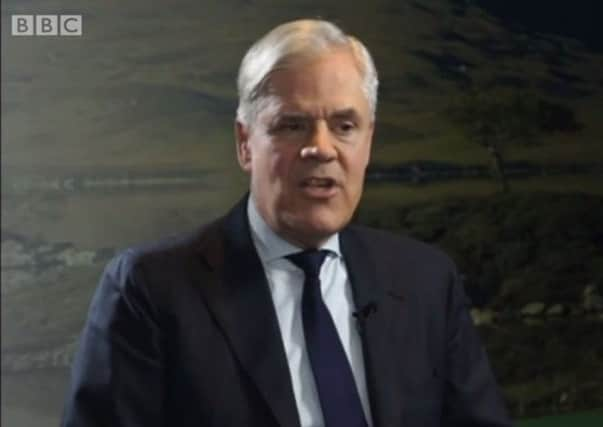Ben Lowry: Dublin and DUP have both taken risky stances on Brexit


Britain has committed to a range of principles that, while seemingly contradictory at points, have delighted Dublin.
Simon Coveney tweeted that “... we have secured assurances for all on the island of Ireland - fully protecting GFA, peace process, all-Island economy and ensuring that there can be NO HARD BORDER on the Island of Ireland post Brexit”.
The Irish government had adopted a risky approach.
Advertisement
Hide AdAdvertisement
Hide AdI talked to a DUP source who said yesterday that Leo Varadkar might not be concerned now that he was burning bridges with unionism, but he might one day regret it.
A much greater risk for Dublin was that it was causing so much anger in London, which will be remembered, and was so fully aligning itself with the European Union.
Will it take this approach through all of the negotiations, and so make things difficult for its crucial trading partner, the UK, or will it only be tough on the border?
Mr Varadkar was taking a further risk – that he would be isolated by the European Union.
Advertisement
Hide AdAdvertisement
Hide AdIf Britain had walked away yesterday (and there is a compelling case it should have done so in the face of such tactics) the pressure on Dublin would have been immense.
There was a telling interview this week on the BBC with Andreas Dombret, an executive board member of the Bundesbank (equivalent of the Bank of England).
He is one of the six people who run the central bank of Germany, which is by far the wealthiest and most powerful country in Europe. Mr Dombret is one of the world’s most influential financial people.
He told the BBC he could “not believe” there would be no EU-UK deal. Asked specifically whether fierce disputes over issues such as the Irish border threatened a final deal, he said “I wouldn’t think so ... there’s too much at stake”.
Advertisement
Hide AdAdvertisement
Hide AdThere will be key people in the EU who want to punish the UK for Brexit, because the UK departure is so damaging to the EU project.
But there are equally powerful voices in Germany who want to press ahead with business with the second biggest European economy, the UK, and similar voices in the next largest economy, France.
There is only so long such forces would let Ireland delay the process.
In his long response statement to yesterday’s agreement, Mr Varadkar’s tone was jubilant but also conciliatory. He must have felt relief that his tactics did not rebound.
Advertisement
Hide AdAdvertisement
Hide AdBut if Dublin has been playing a risky game, so too has the DUP.
The party made a mistake, I feel, by not having a more open debate on Brexit in the run-up to the referendum, as the Tory party did.
It would have been harder to caricature them as dinosaurs if the public had known some key members were uneasy about Brexit.
DUP members were overwhelmingly pro Brexit but quite a few were anti. They were allowed by the party to be so, and some did speak out for Remain.
Advertisement
Hide AdAdvertisement
Hide AdDavid Cather, a DUP member in South Belfast who works in business, wrote a letter to the News Letter urging readers to remember that “unionism is by definition an outward looking philosophy, ‘ourselves alone’ has never been our cry ...unionism has from its earliest days, in the 19th century, argued that isolating ourselves on our island would condemn us to being an economic backwater”.
But most DUP Remainers stayed quiet, perhaps thinking it made their Britishness seem lily livered.
Not only that, but since June 2016 the party has been pro the fullest Brexit – quitting single market, customs union and any European Court of Justice jurisdiction.
My colleague Sam McBride has repeatedly pointed out that commentators in Great Britain have wrongly said the DUP opposed a hard Brexit. No, they opposed a hard border, but supported a hard Brexit.
Advertisement
Hide AdAdvertisement
Hide AdThis week we have seen the almost insurmountable difficulties in squaring those two aims.
There has been barely any debate within unionism on the merits of all the UK staying in or as close as possible to the single market.
The Scottish Tory leader, Ruth Davidson, on the other hand, managed the feat of showing loyalty to her party while arguing for a softer Brexit after the referendum result.
In recent days she cited the damage to the Union of a varying approach in different parts of the UK.
Advertisement
Hide AdAdvertisement
Hide AdAnother thing that unionists have been slow to acknowledge is the extent to which Theresa May’s disastrous election result has made it harder to deliver a full Brexit.
Mrs May’s political weakness has been painfully apparent in recent weeks, in which UK stances on Brexit have been diluted, including on the divorce settlement.
We almost saw the UK government cave in to Dublin on the border this week. If it had not been for an electoral fluke that gives a unionist party the balance of power at Westminster, London might have committed to an arrangement that led to a border in the Irish Sea.
Even yesterday’s revised wording seems to give more assurances to Dublin than it does to unionists.
Advertisement
Hide AdAdvertisement
Hide AdThere now needs to be at least a debate within unionism on the UK-wide ways of softening Brexit Ms Davidson is discussing.
• Ben Lowry (@BenLowry2) is News Letter deputy editor